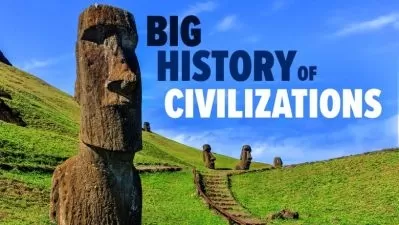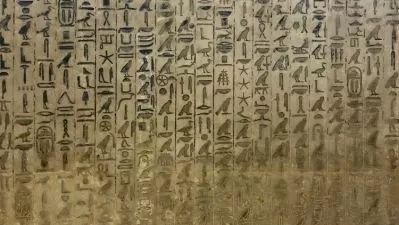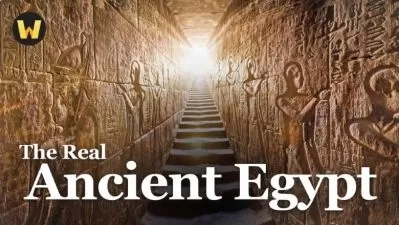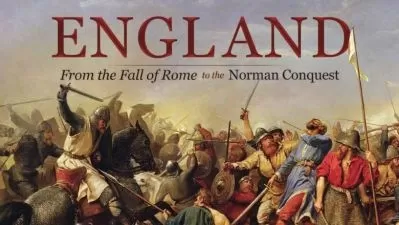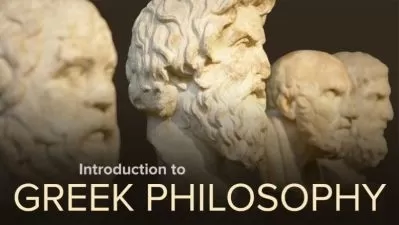Ordinary Americans in the Revolution
Richard Bell
11:44:59
Description
“We have it in our power to begin the world over again…” —Tom Paine
The American Revolution was an event of world-changing proportions. Never before in the modern era had a large population undertaken the act of breaking free from a monarchy and its aristocratic control, with the improbable ideal of a representative, egalitarian government. The thought processes involved in this epic undertaking swept away centuries of ingrained thinking about government, citizenship, and the nature of human society itself.
When we think of the American Revolution, we tend to pay attention to the iconic names—Washington, Jefferson, Hamilton, and Franklin—the thinkers who articulated the vision of the new nation and became its standard bearers and leading lights. But it’s easy to forget that the American Revolution was an insurgent movement requiring mass communication, mass mobilization, and a single-mindedness of purpose on the part of a huge number of colonists acting together, joined by a common cause.
Who were these people? What drove them to participate in the unlikely attempt to defeat the world’s mightiest superpower? How did they think and act to bring about a new form of society and government? Perhaps most significantly, how did they view themselves and the stake they had in this most daring of social and political experiments?
In Ordinary Americans of the Revolution, taught by Professor Richard Bell of the University of Maryland, you’ll discover the American Revolution from a startlingly different perspective: not the perspective of the Founding Fathers, who were people of wealth and privilege, but of the common people who made the revolution happen. Over the course of 28 lessons, you’ll meet the soldiers, midwives, artisans, shopkeepers, farmers, enslaved people, and all the other men and women—European-American, Native American, and African American—with whom the success or failure of the American Revolution depended. Without these people, there could have been no revolution.
Meet the Unknown Actors in the Founding of the United States
Through this course, you’ll journey far beyond historic battles and political events into the intimate experience of people such as:
- George Hewes, an obscure shoemaker who became enmeshed in the events of the Revolution, including the Boston Tea Party, in which he played a leading role;
- Tom Paine, a British immigrant whose galvanizing rhetoric in the pamphlet Common Sense catalyzed a mass movement focused on the daring goal of independence;
- Deborah Sampson, a young weaver who fought for more than a year in the Continental Army and distinguished herself in battle, disguised as a man;
- Harry Washington, the former slave of George Washington who became a loyalist serving in British regiments only to pivot again and fight British tyranny in Sierra Leone; and
- Mary Silliman, whose poignant letters speak of the hardships and sacrifices of many thousands of women who supported the patriot cause.
You’ll look at a wide range of individuals in the context of revolutionary politics, action, along with the challenges, tragedies, and victories of daily living during the conflict.
In many ways, this is a different American Revolution than the one we hear about on Independence Day. For large numbers of common people, the revolution brought severe economic hardships, displacement, devastation, and discontent. And for many on the lower rungs of society, it was a struggle that began with the fight against Britain, but it did not stop when the war itself ended.
In Richard’s gripping presentation, this inquiry brings the human experience and dimensions of the revolution alive in penetrating detail and poignancy. You’ll meet the rich tapestry of people swept up in the fight for self-governance, from the early days of resistance to British policy to the outbreak of war and the dramatic events that gave birth to the United States.
The result is a vivid look at how the revolution felt to those on the ground, how it unfolded in individual actions, and how those actions shaped the course of the conflict and its outcome. The experience of these unfamiliar Americans offers a deeper understanding of the causes, meanings, and consequences of the American Revolution.
Grasp How a World-Changing Movement Took Shape
In charting the experience of common people during the revolution, the course unfolds as a series of paired lessons. The first lesson of each pair focuses on a particular group, such as enlisted soldiers, working people, African Americans, or non-combatants; the second lesson then delves into the life of a specific individual whose experience is emblematic of the group. In the course of the lessons, you’ll hear the extraordinary stories of:
- Ebenezer Mackintosh: Witness how resistance to severe British taxation of imported goods stoked the sentiment of revolution, uniting colonists in mass boycotts. Follow the experience of Ebenezer Mackintosh, a fireman and leader of street parades who rose to command the Boston mob during the Stamp Act Crisis.
- Crispus Attucks: Track the events of the British military occupation of Boston following violence against customs officials that inflamed anti-British feeling across the colonies. Consider the Boston Massacre, a political cause célèbre, and the role of one of the participants, a mixed-race sailor named Crispus Attucks.
- Martha Ballard: Learn how American women became political actors during the Revolution, beginning with their essential roles in boycotts, marches, and protests—roles that they retained following the war. See what the diary of Martha Ballard, a midwife, reveals about the changing fortunes of American women.
- Thomas Jeremiah: Reveal the harrowing challenges the revolution brought to African Americans as people on both sides of the conflict attempted to recruit Black people to their cause—some with promises of freedom, and others with threats of force. Observe how a free Black pilot, Thomas Jeremiah, became the focus of the wrath of slaveholders in Charleston, South Carolina.
- Daniel Shays: Following the war, ordinary working people’s economic fortunes declined, leading them to embrace tactics of protest they’d learned in the leadup to the revolution. Follow the Shays Rebellion, where soldier-turned-farmer Daniel Shays led disaffected Massachusetts farmers in a violent insurrection.
- Molly Brant: Grasp how the revolution brought drastic and permanent changes to Native Americans, with most tribal groups siding with the British. Encounter the remarkable figure of Molly Brant, a Native Mohawk and wife of a British official, whose diplomatic abilities and leadership aided her people in navigating the extreme challenges of the war.
Taste the Human Experience of an Epic Conflict
Richard offers nuanced and challenging perspectives along with his amazingly detailed knowledge to make this a tremendously compelling story, often revealing surprising features of the revolution. For example, you learn that:
- Manpower shortages in the Continental Army were so severe that a desperate George Washington authorized regiments of enslaved people, and by 1778 most new recruits came from the bottom rungs of society.
- In many ways, the American Revolution was an Indian war—by 1779 one third of the Continental Army was involved in fighting with British-allied Native Americans.
- For many, loyalism to the British was the default position; during the war, 19,000 men enlisted in British loyalist regiments, giving the conflict the character of a civil war.
- In the wake of the ousting of the British, the new American government worked quickly to protect itself against criticism; the new Constitution provided powers to suppress insurrections, and President Adams’ Alien and Sedition Acts made it possible to prosecute critics of the government as traitors and enemies of the state.
- A misreading of Jefferson’s declaration that “all men are created equal” has made that statement into a Golden Rule of human rights.
In Ordinary Americans of the Revolution, you’ll experience the multifaceted complexity—and the human face—of the vast struggle that forged the United States.
More details
User Reviews
Rating
Richard Bell
Instructor's CoursesRichard Bell is an Associate Professor of History at the University of Maryland, College Park. He holds a BA from the University of Cambridge and a PhD from Harvard University. Dr. Bell has won more than a dozen teaching awards, including the Board of Regents’ Faculty Award for Excellence in Teaching, the highest honor for teaching faculty in the University System of Maryland. He has held major research fellowships at Yale University, the University of Cambridge, and the Library of Congress.
Dr. Bell serves as a trustee of the Maryland Historical Society, an elected member of the Massachusetts Historical Society, and a fellow of the Royal Historical Society. He is the author or coeditor of multiple journal articles and three books: We Shall Be No More: Suicide and Self-Government in the Newly United States; Buried Lives: Incarcerated in Early America; and Stolen: Five Free Boys Kidnapped into Slavery and Their Astonishing Odyssey Home, which received a National Endowment for the Humanities Public Scholar Award.

The Great Courses
View courses The Great Courses- language english
- Training sessions 30
- duration 11:44:59
- English subtitles has
- Release Date 2023/08/19






